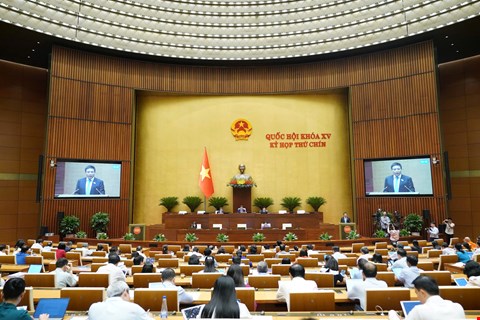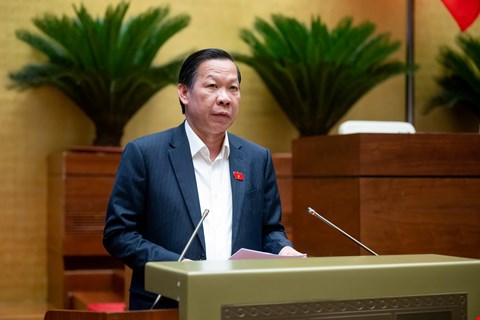On the afternoon of May 14, the National Assembly listened to Minister of Finance Nguyen Van Thang, authorized by the Prime Minister, present the Draft Law on the State Budget (amended).
Supplementing the authority of the Prime Minister
One of the new points in the draft law is the addition of an Article on the duties and powers of the Prime Minister.
According to current law, the National Assembly has the right to decide on financial policies, state budgets, amend or abolish taxes, national debt safety limits, public debt, government debt; 5-year financial plan.
The National Assembly also resolved the State budget estimate (total State budget revenue and expenditure, regular expenditure levels for the fields of education, training and vocational training, science and technology), central budget allocation, revenue and expenditure estimates of each ministry, ministerial-level and local agencies, etc.
In the draft Law on the State Budget (amended), the Government proposed that the National Assembly decide on the budget expenditure estimate, but did not include the allocation for the fields of education, training and vocational training, science, technology and innovation.
The National Assembly is also expected to not allocate central budget expenditures to each ministry and central agency according to the field (development investment expenditure, regular expenditure).
Instead, the authority to decide on these expenditures is proposed to be assigned to the Prime Minister.
In addition, the draft also adds the Prime Minister's rights in deciding on detailed allocations for undetailed items; deciding on the use of central budget reserves.

The Government also proposed additional regulations on tasks and powers of the provincial People's Council (People's Council) that is allowed to issue a number of charges and fees outside the list of the prescribed laws and charges; decide on budget expenditure regimes for a number of social security tasks, local regimes and policies; The decision to assign the commune -level People's Council to promulgate policies and regimes in accordance with the actual situation in the locality.
According to Minister of Finance Nguyen Van Thang, this supplement and adjustment aims to implement the policy of increasing decentralization and delegation of authority in assigning tasks of collection and expenditure and creating proactive management of estimates and budgets approved by the National Assembly and People's Councils.
Adjusting the division of revenue between the central and local governments
Another important content in this bill is to fundamentally change the way of dividing budget revenues between the central and local governments, including revenues from corporate income tax, personal income, special consumption and environmental protection.
In addition, the draft law changes the calculation of the rate of revenue division from value-added tax (VAT), including VAT on imported goods. After deducting the tax refund, the central budget will be divided by 70%, while the local budget will receive 30%.
Supplement the regulation of the 30% VAT after deducting tax refunds allocated according to principles, criteria (population, area, etc.) and taking into account the specific factors of each locality.
In addition, the draft also proposes to change the way of dividing revenue from land use fees and land rents. Instead of letting localities enjoy the full benefits as at present, the draft law stipulates that localities that cannot balance their budgets will only enjoy 70%.
Supplementing regulations on bonuses of 10% of the excess export tax and import tax revenue estimates across the land border...

Report on verification of the above contents, Chairman of the Economic and Finance Committee (KTTC) Phan Van Mua said that the KTTC Committee basically agreed with changing the method of dividing the revenue source between the central budget and the local budget, accordingly, the regulation of the principle of decentralization of revenue sources, spending tasks and relations between budget levels in the budget stability period.
Regarding the division ratio, according to Mr. Phan Van Mai, to ensure flexibility in adjusting the division ratio between allocated revenue sources in cases of large fluctuations or large differences in state budget revenue and expenditure between localities, without having to submit to the National Assembly to amend the Law, the majority of opinions agreed with the plan only stipulated in the draft Law on principles, allocated revenue sources...
The National Assembly is expected to discuss this draft law in the group on May 15, the hall on May 26 and vote to approve it on June 25.











